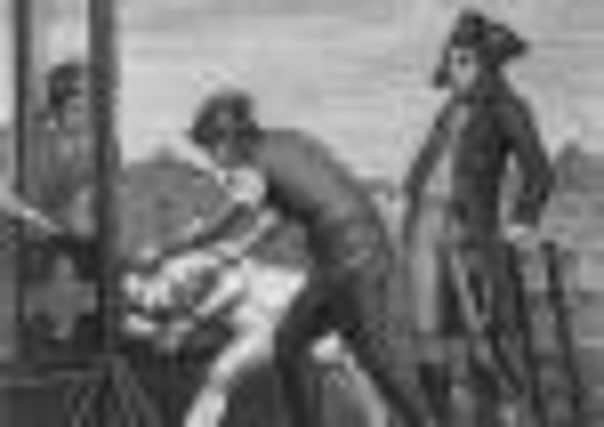Book review: Robespierre: A Revolutionary Life


After his death by guillotine in 1794, two distinct narratives emerged: he was the Terror of the Revolution made incarnate; a hypocrite who secretly indulged in orgies and whose apartment included a shrine to himself. Or he genuinely was, as he was called, “The Incorruptible”, a virginal, ascetic figure who became the scapegoat during the transition from the Convention to the Directory. Peter McPhee’s fine new life of Robespierre relies on the first hand, day-to-day accounts rather than the posthumous vilification and hagiography, and in it emerges a quite different portrait of the man.
McPhee cleverly begins with a letter Robespierre wrote to a friend in 1791, in which he suggested that when the Revolution was over, he would like to be a judge in Béthune, near provincial Arras where he grew up. It is an effective method of making the reader remember that the revolutionaries did not know the future, and that they did foresee a time after the Revolution. Although sometimes depicted as an intransigent ideologue, this biography shows Robespierre continually changing. His opinions on capital punishment, press censorship, Britain, the declaration of war and the possible future role of Louis XVI all altered over the course of his short life. Robespierre was pock-marked, twitchy, and humourless but inspired letters from female admirers that resemble those sent to modern pop stars.
Advertisement
Hide AdAdvertisement
Hide AdThe paradoxes in his character were multiple, but McPhee does not (as some biographers have done) attempt to reduce these to some trauma or deep-seated repression: as the Scottish artist Ian Hamilton Finlay wrote in Revolutionary Pursuits, “The French Revolution was something other than the French nation on the psychoanalyst’s couch”. That his father was feckless and his mother died young are insufficient as causes to “explain” Robespierre.
Robespierre, following Rousseau, believed profoundly that people were inherently good; but, being good and uneducated, they were also naive, and prone to being misled and manipulated. By tracking his biographical quarry so assiduously, McPhee shows how this principle led to an almost paranoid sense of external, counter-revolutionary forces with malign intentions. Of course, to some extent Robespierre was quite right to be paranoid.
By the time he send his student friend Camille Desmoulins, and George Danton, to the guillotine, in his role on the Committee for Public Safety, the double-dealing of Mirabeau, the defection of Dumouriez and Brissot’s (still disputed) role as a police spy would have been uppermost in his mind. Running simultaneously with the quick-fire changes in policy and trust – the book continually reminds the reader how frenetically fast the Revolution was – we have Robespierre’s constant illnesses. Colin Jones rightly says of the book that “Robespierre emerges less as a man who ruined the Revolution than as a man the Revolution ruined”. Although it would be obtuse to call Robespierre a moderate, there is a sense in which he was constantly trying to find a middle path; between, say, the anti-Christian Hébert faction and those supporting Roman Catholicism, between rule by the people and rule by the representatives of the people.
Occasionally, this close focus might lead readers who are not steeped in the period’s history scampering to Wikipedia to check exactly what the Girondists believed or what the Vendée Insurrection involved. It also means that sometimes the immersion is blinding: when Robespierre said on 18 Brumaire at the Jacobin Club that “if God did not exist it would be necessary to invent him”, there is no indication that he is quoting Voltaire (or even any note that Robespierre had read Voltaire). Nevertheless, the benefit of detail outweighs any misgivings.
Narrating the Revolution through one figure is inspiring, and problematic, particularly when it comes to Robespierre’s death. So much ink has been expended over determining to what extent he was personally culpable for the Terror that less has been devoted to a question usually asked in these situations: cui bono? Who benefitted from Robespierre’s execution – other than, as conservative historians would have it, the entire population of France? Because this book ends with Robespierre himself, we do not see the outcomes. Among the conspirators against him and his accusers, Fouché, who had committed atrocities in Lyon, eventually became Napoleon’s minister of police. Barère became a spy for Napoleon, Carnot and Barras sat as directeurs, Tallien joined the Egyptian expedition with Napoleon and eventually, as a prisoner of the English, had amicable meetings with the Whigs. Perhaps only Billhaud kept any integrity, refusing his pardon and eventually dying in Haiti. For all the hysteria that Robespierre was aiming to be, if not the Messiah, then at least Cromwell, it was another figure entirely to whom that role would fall.
Robespierre’s life was revolutionary – his saying “Would you have a Revolution without a Revolution?” has implications to this day. But in another way it was remarkably restricted. Apart from Arras and its environs, he only ever lived in Paris. He never went to the military front, like Saint-Just, nor is there any evidence he ever saw an execution. In all likelihood, he never saw the sea.
• Robespierre: A Revolutionary Life
BY Peter McPhee
Yale University Press, 362pp, £25